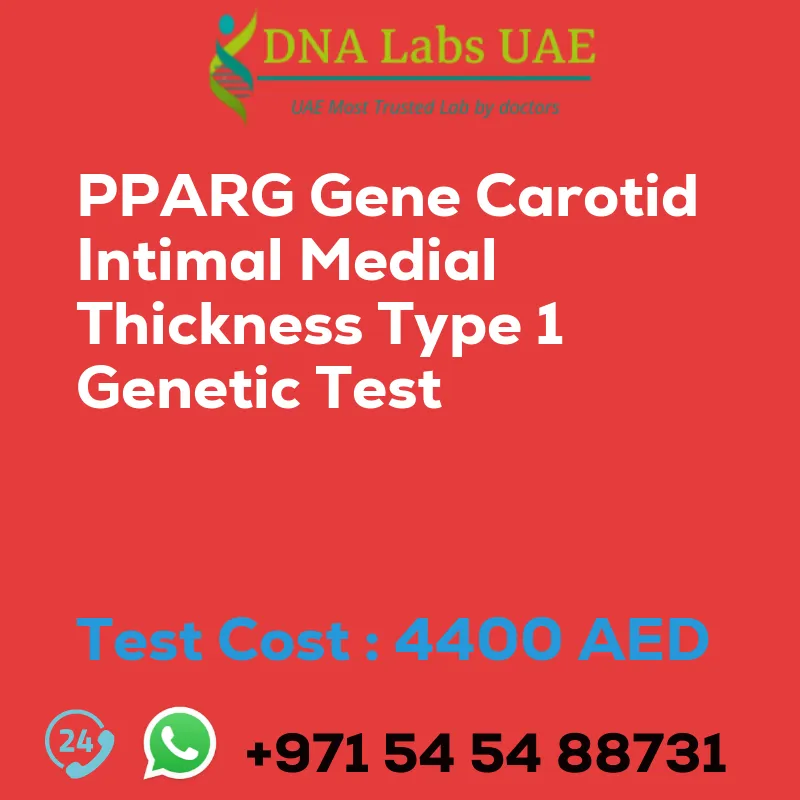PPARG Gene Carotid Intimal Medial Thickness Type 1 Genetic Test
Welcome to DNA Labs UAE, where we offer the PPARG Gene Carotid Intimal Medial Thickness Type 1 Genetic Test. This test is designed to provide valuable insights into an individual’s genetic predisposition to develop increased CIMT and potentially guide personalized treatment or preventive strategies for cardiovascular disease.
Test Name: PPARG Gene Carotid Intimal Medial Thickness Type 1 Genetic Test
Components: DNA Labs UAE offers this comprehensive genetic test at a cost of 4400.0 AED.
Sample Condition: The test requires a blood sample, extracted DNA, or one drop of blood on an FTA Card.
Report Delivery: The test results will be delivered within 3 to 4 weeks.
Method: We utilize NGS Technology for this genetic test.
Test Type: The PPARG Gene Carotid Intimal Medial Thickness Type 1 Genetic Test falls under the category of Vascular Diseases.
Doctor: This test can be ordered by a General Physician.
Test Department: Our Genetics department handles this test.
Pre Test Information: It is important to provide the clinical history of the patient who is undergoing the PPARG Gene Carotid Intimal Medial Thickness Type 1 NGS Genetic DNA Test. Additionally, a Genetic Counselling session may be conducted to draw a pedigree chart of family members affected by the PPARG Gene Carotid Intimal Medial Thickness Type 1 NGS Genetic DNA Test gene PPARG.
Test Details
The PPARG gene is responsible for encoding the peroxisome proliferator-activated receptor gamma, a nuclear receptor involved in regulating the expression of genes related to lipid and glucose metabolism. Carotid intimal medial thickness (CIMT) refers to the thickness of the innermost layers of the carotid artery, which serves as an indicator of atherosclerosis and cardiovascular disease risk.
Type 1 NGS (Next-Generation Sequencing) genetic testing is a high-throughput sequencing technology that allows for the simultaneous analysis of multiple genes. In the context of PPARG and CIMT, a type 1 NGS genetic test involves sequencing the PPARG gene to identify any variations or mutations that may be associated with changes in CIMT and increased cardiovascular disease risk.
By identifying specific genetic variants in the PPARG gene, this type of genetic test can provide valuable insights into an individual’s genetic predisposition to develop increased CIMT. This information can potentially guide personalized treatment or preventive strategies for cardiovascular disease.
| Test Name | PPARG Gene Carotid intimal medial thickness type 1 Genetic Test |
|---|---|
| Components | |
| Price | 4400.0 AED |
| Sample Condition | Blood or Extracted DNA or One drop Blood on FTA Card |
| Report Delivery | 3 to 4 Weeks |
| Method | NGS Technology |
| Test type | Vascular Diseases |
| Doctor | General Physician |
| Test Department: | Genetics |
| Pre Test Information | Clinical History of Patient who is going for PPARG Gene Carotid intimal medial thickness type 1 NGS Genetic DNA Test. A Genetic Counselling session to draw a pedigree chart of family members affected with PPARG Gene Carotid intimal medial thickness type 1 NGS Genetic DNA Test gene PPARG |
| Test Details |
The PPARG gene is responsible for encoding the peroxisome proliferator-activated receptor gamma, which is a nuclear receptor involved in regulating the expression of genes related to lipid and glucose metabolism. Carotid intimal medial thickness (CIMT) refers to the thickness of the innermost layers of the carotid artery, which can be an indicator of atherosclerosis and cardiovascular disease risk. Type 1 NGS (Next-Generation Sequencing) genetic testing refers to a high-throughput sequencing technology that can analyze multiple genes simultaneously. In the context of PPARG and CIMT, a type 1 NGS genetic test would involve sequencing the PPARG gene to identify any variations or mutations that may be associated with changes in CIMT and increased cardiovascular disease risk. By identifying specific genetic variants in the PPARG gene, this type of genetic test can provide insights into an individual’s genetic predisposition to develop increased CIMT and potentially guide personalized treatment or preventive strategies for cardiovascular disease. |







